Text
youtube
Όχι πραγματικά… ακούστε τι λέει. Που ανάθεμα αν έχω ακούσει άλλο μουσικό / διάσημο τα τελευταία είκοσι χρόνια να αναλύει αυτό το σημαντικότατο ζήτημα.
Κι όμως, κανένα άλλο άχυρο ή τέλος πάντων λιγότερο συνειδητοποιημένο άτομο που έχουμε στείλει δεν έχει δεχτεί τόσες επιθέσεις από την Ελληνική κοινωνία. Και από ποιους;;; Από ποιους;;;;;;;;;;;;
Από τους φερόμενους ως «πατριώτες». Αυτή είναι μια απτή απόδειξη ότι η αγάπη ενός για τον τόπο του και την εκτίμηση στην κουλτούρα του ουδεμία σχέση έχει με τον εθνικισμό και τον κακώς εννοούμενο πατριωτισμό.
Δεν είναι σωστό να φοβάται κάποιος να εξερευνήσει ή και να αγαπήσει τα στοιχεία του τόπου και της χώρας του από ανησυχία μην θεωρηθεί εθνικιστής, διότι ο εθνικιστής δεν καθορίζεται τόσο από την αγάπη και τη γνώση για τη χώρα του, αλλά από το μίσος, την άγνοια και την περιφρόνησή του για τις υπόλοιπες.
Η Σάττι λοιπόν γνωρίζει περισσότερα για τη χώρα αυτή από τους «πατριώτες» Έλληνες που τη βρίζουν, την χαρακτηρίζουν αλλοδαπή θεωρώντας ότι αυτό είναι κάτι μειωτικό και φυσικά αγνοώντας ότι ούτε εκ των πραγμάτων είναι αλλοδαπή.
Οι Έλληνες εθνικιστές ή πατριώτες που ξερνάνε φωτιές εξαιτίας του τραγουδιού της Σάττι αλλά και γενικότερα ΠΟΛΛΟΙ από τους εθνικιστές πρέπει να καταλάβετε ότι σε μεγάλο βαθμό:
Δεν γνωρίζουν ελληνική ιστορία παρά λίγα, επιλεκτικά σημεία (Μέγας Αλέξανδρος, Σωκράτης, Παλαιολόγος, Κολοκοτρώνης και κλείσαμε. Και πολλά λέω ίσως)
Δεν κατανοούν τι συνιστά Ελληνικό πολιτισμό και τι όχι.
Δεν φέρονται με τρόπο που να τιμά την παιδεία που ισχυρίζονται ότι έχουν. (Δηλαδή δε μπορείς να κατηγορείς την Σάττι ότι μας δείχνει απολίτιστους και εσύ να βρίζεις, να καταριέσαι και να παρακαλάς ξένους να μην την στηρίξουν.)
Μπορεί κάποιος να σκεφτεί ότι το ανάγω σε ζήτημα με μεγαλύτερες διαστάσεις από ό,τι πραγματικά έχει αλλά δεν είναι έτσι. Είναι όντως τρελό αλλά η φετινή συμμετοχή στην Eurovision απογύμνωσε μπροστά μας ένα κοινωνικό φαινόμενο, που εγώ τουλάχιστον δεν είχα κατανοήσει τον βαθμό της σοβαρότητάς του. Οι εφημερίδες ήδη το αναλύουν. Μέχρι και αμερικανικό βίντεο, εξαιρετικά διορατικό, ανέβηκε στο YouTube αναλύοντας τις αντιδράσεις κατά της Σάττι (με άλλα λόγια οι «πατριώτες» μας έκαναν ρεζίλι διεθνώς).
Μια ενδιαφέρουσα παρατήρηση που έκανα είναι ότι πολλοί από τους πιο φανατικούς πολέμιους του τραγουδιού και του βίντεο είναι Έλληνες ομογενείς ή Έλληνες που μετανάστευσαν στην Δύση πρόσφατα. Δεν μπορώ να πω με σιγουριά τι σημαίνει αυτό, αλλά υποψιάζομαι ότι σχετίζεται με το αίσθημα κατωτερότητας απέναντι στους δυτικούς που κουβαλούν αυτοί οι ψευτοπερήφανοι Έλληνες.
Ας τονίσω άλλη μια φορά ότι κανείς δε λέει ότι πρέπει να σου αρέσει το τραγούδι ή το βίντεο ή να συμφωνείς απόλυτα με την οπτική της Σάττι. Άλλο αυτό όμως και άλλο να την καταριέσαι, να την ανακηρύσσεις εχθρό του έθνους και να αυτομαστιγώνεσαι στους ξένους επειδή η Ελλάδα την επέλεξε να μας εκπροσωπήσει. Καταλαβαίνετε ασφαλώς ότι υπάρχει τεράστια διαφορά μεταξύ των δύο.
Θα προσθέσω κάτι ακόμα εδώ, που θα φανεί άσχετο, αλλά δεν είναι. Όλοι ξέρετε αυτά τα βίντεο που κάθε χρόνο ρωτάνε τους νέους τι γιορτάζουμε στις εθνικές εορτές. Δείτε όμως τώρα αυτό, με μεσήλικες. Εάν αντέξετε βέβαια.
youtube
Αυτά λοιπόν. Και επαναλαμβάνω για να γίνει εντελώς κατανοητό: δεν έχει να κάνει με μια ηθική υποχρέωση να είσαι παντογνώστης πάνω στην ελληνική ιστορία ή κουλτούρα ούτε απαραίτητα να την αγαπάς τόσο. Δεν λέω αυτό. ΑΝ ΟΜΩΣ βλέπεις ότι πολλοί που ζουν σε αυτήν την χώρα 50-60 χρόνια και δηλώνουν πατριώτες / παλαιών αρχών / δεξιών πεποιθήσεων σε αυτόν τον μισό αιώνα που ζουν εδώ δεν κατάφεραν να καταλάβουν τι γιορτάζεται ΚΑΘΕ ΧΡΟΝΟ…
ε αυτό κάτι λέει. Για το ποιοι είμαστε σαν κοινωνία, σαν πολιτικά όντα, τι επιτυγχάνεται από το ελληνικό σχολείο, ποιο είναι το γνωστικό επίπεδο, τι αγωγή λαμβάνουμε από το σπίτι, γιατί η Ελλάδα δεν θα ορθοποδήσει σύντομα. Και γιατί επιλέξαμε να δούμε την Σάττι σαν εχθρό, για παράδειγμα. Λέει πολλά.
#Youtube#greece#ελληνικό ποστ#γρεεκ ποστ#opinion#γνώμη#coals of Greece#Marina Satti#rant#Greek facts
5 notes
·
View notes
Photo
What the hell is going on with this map. Let’s be real here.
Greece as a state was established in 1821 AD.
Greeks as an ethnic group and culture exist way prior to the 8th century BC (roughly around 1750 BC) but their most popular name of choice was Achaeans instead of Hellenes.
By the 8th century the name Hellenes becomes more popular. But both are used as well as several others and denote the same group of people. Hellas (Greece) did exist as a region at that time but it wasn’t a state in the modern sense, with central government.
I am pretty sure there is a shitload of inaccuracies with the others, since Greece was done so wrong. For example, Turkey as a country exists since 1923. In 1299 even the Ottoman Empire didn’t exist as this is where the Byzantine Empire was. Similarly, Albania was founded in 1912.
I think what they did in this map is they put when each nation / ethnicity was first historically mentioned ie Greeks as “Hellenes” were first mentioned by Homer in the 9-8th century BC, the Ottoman Turks showed up around 1299 AD and the Albanians are first mentioned in Medieval texts in 1190 AD. But that’s very different from saying “year of country establishing”.
It would be okay if the label was phrased differently.
PS. For avoidance of confusion, the modern state is called Hellas. “Greece” is not the official name of the country, never has been, and Greeks generally do not use that term except very rarely.
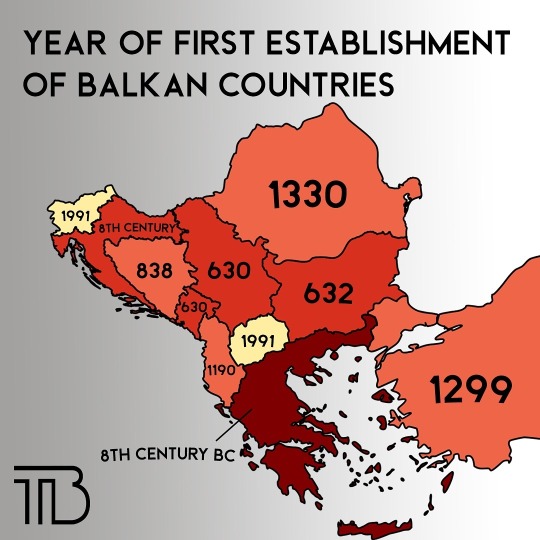
Year of first establishment of Balkan countries.
by try.balkan
133 notes
·
View notes
Note
What's your opinion on the costumes now that the flame ceremony on the Olympia happened?
Personally Μαίρη Μηνά is an amazing actress and she delivered to the point she overshadowed the costumes but still felt like cheap carnival costumes and not great ones to honour the ceremony.
Blimey, anon, I hoped we would all pretend this never happened XD
Those costumes were reallly bad and I dislike that even though the design got unanimous negative reactions, they ignored everybody and went on without any adjustments to it.
But I agree that Mary Mina and all other participating actors / models performed with a lot of elegance and dignity and therefore the result overall was better than in the horrifying costume presentation.


Mary Mina was great but boy the designer Mary Katrantzou didn't do her any justice
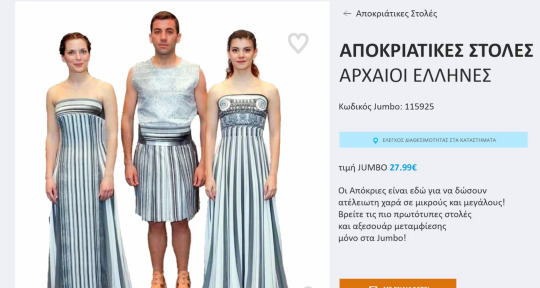
Btw this meme is wrong... it's not "ancient Greeks" carnival costumes, it's "ancient greek columns" carnival costumes... that's the whole problem lol I am also dying at the price 27.99 but let's be real I wouldn't waste even 5 euros on this crap. To think this was done by a "high fashion" designer oh my god.......... Don't get me wrong, she is a good designer but here we have a classic case of being overwhelmed by ambition and wanting to do something "different".
I will say however that her goal was clearly to create motion and a 3D effect with her costumes:


And she succeeded in this but it doesn’t change the fact that when standing plainly the costume did not look good.
Sometimes simpler is much better. Everytime I want to clear my visual palate from this I go back to the ceremony with Katerina Lehou our mothering mother
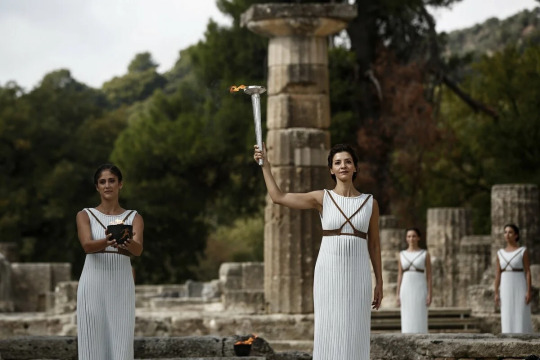
#greece#coals of greece#olympic flame ceremony#olympic games#paris 2024#olympia#elis#peloponnese#peloponnisos#mainland#ilia#greek culture#but like in a violated form#anon#ask
4 notes
·
View notes
Photo
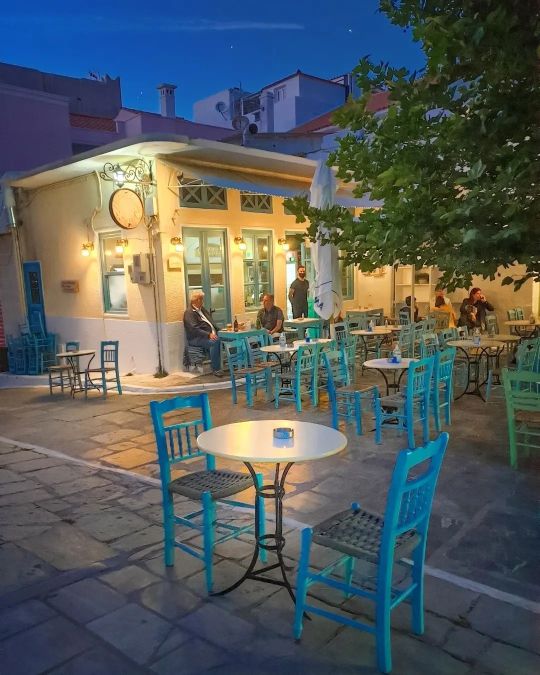
This table there is calling my name. Andros island, Greece by Giannis Tsounis (Blueman)💦
#greece#europe#travel#wanderlust#traditional#shop#town#andros#cyclades#cycladic islands#greek islands
52 notes
·
View notes
Photo
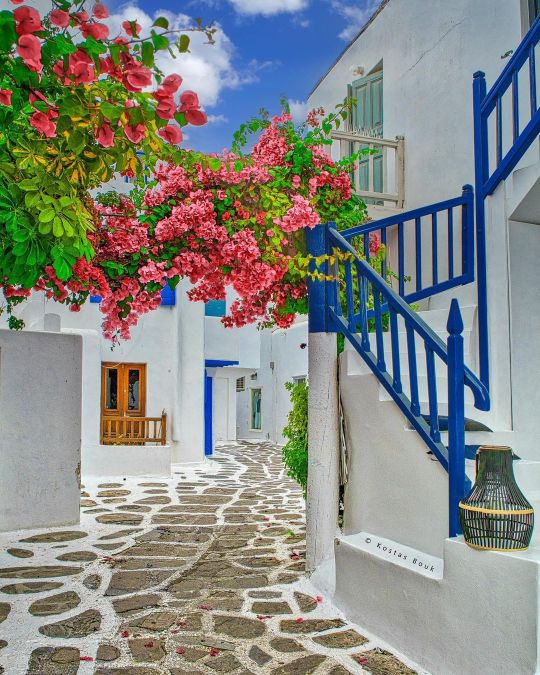

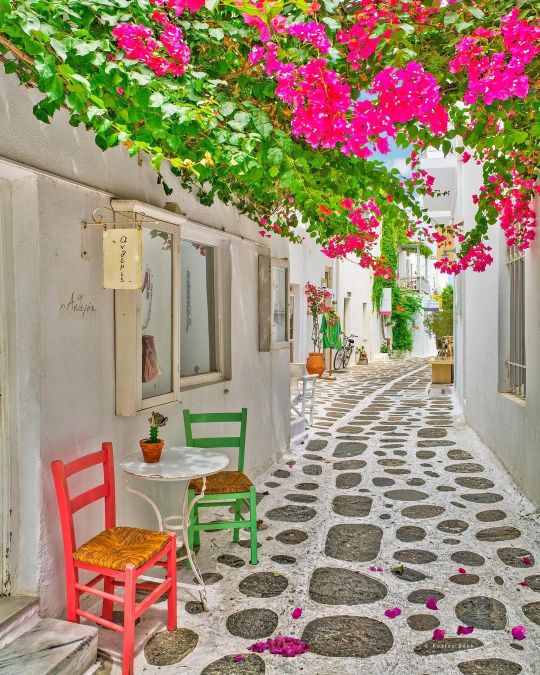
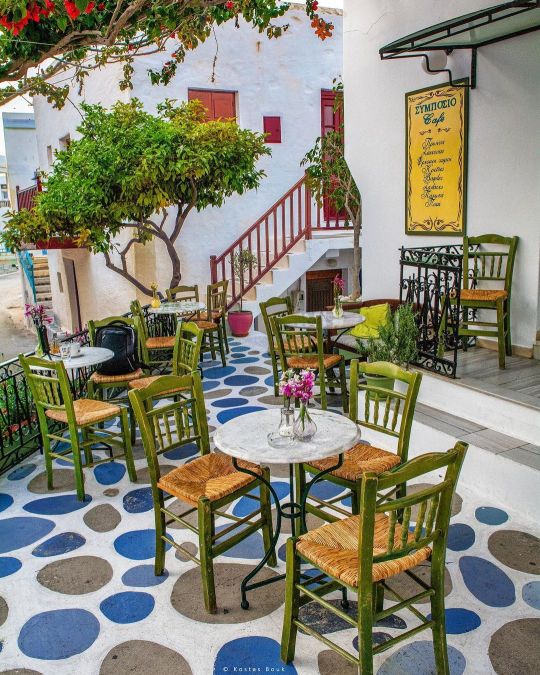
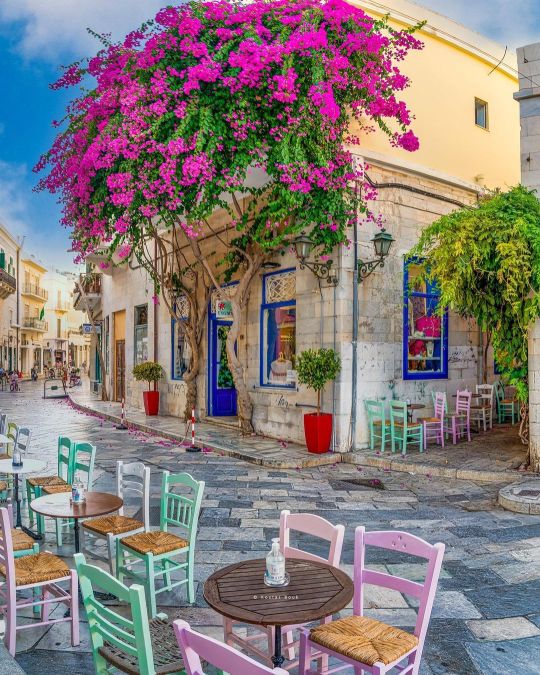
Mýkonos - Paros - Syros
Cycladic island aesthetics by Kostas Bouk.
#greece#europe#travel#wanderlust#aesthetic#colourful#alleys#flowers#cobblestone#architecture#design#mykonos#paros#syros#cyclades#cycladic islands#greek islands#large
105 notes
·
View notes
Text
@Greeks and @Greek speakers who might have watched it, were you watching and is anyone interested in reading a post about Η Μάγισσα, the final fates of the characters, whether they pulled off the premise of “justice paid off”, maybe some assessment on the evilness and cleverness of certain characters?
Pls only Greek speakers vote so we don’t get any skewed results
(Post will have spoilers and be in English for the occasional interested Greek expat)
#Greece#Greek tv#i magissa#the witch#η μάγισσα#Greek tv series#asking the Greeks something at 3am#success is guaranteed 🤡🤡🤡
7 notes
·
View notes
Text










Η Μάγισσα (The witch)
1×56
2/3
-> 1/3
-> 3/3
15 notes
·
View notes
Photo

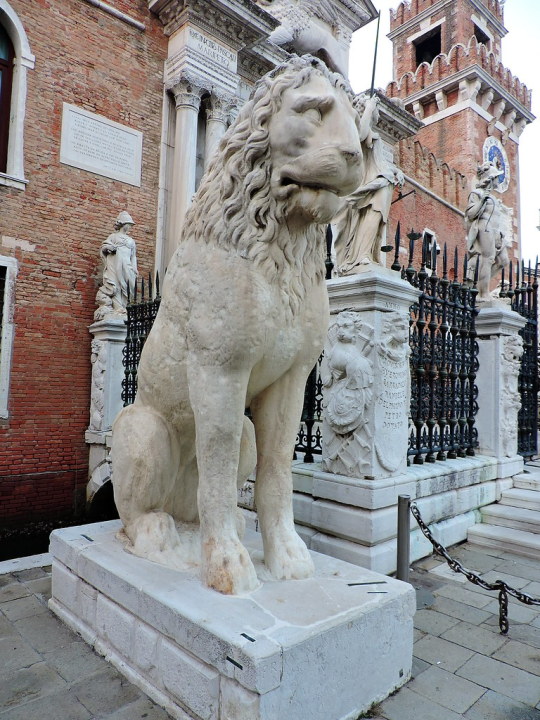
The Parthenon marbles this, the Parthenon marbles that...
I don´t know how known the extent of Greek antiquity looting by West Europeans is to most people or most have a limited image painting the British Museum or Lord Elgin as the sole / main villain.
Here we have the Piraeus Lion (Italian: Leone del Pireo) , one of the four lions decorating the Venetian arsenal in Italy. The prominence of the 3 meter tall lion statue in the port is such that it is also known as Porto Leone ("Lion Port").
We are eternally thankful for the massive courtesy of calling the statue the Piraeus Lion, indicating its origin from Piraeus, the port city of Athens. The statue was sculpted around 360 BC and remained a famous landmark of Piraeus, Athens until 1687.
In 1687, it was looted by Venetian naval commander Francesco Morosini, the man also notoriously responsible for the bombardment of the Parthenon during the wars of the Venetians with the Ottoman Turks, therefore in fact the most irreversible destruction it suffered in its 2,500 year long history. Somehow they were fighting the Turks but it was the Greeks paying for it.
Is it totally and universally acknowledged that Morosini illegally looted this sculpture among so many others? Yes. Does the Piraeus Lion still sit casually in the Venetian port in 2024 as if Venice has a shortage of artefacts to decorate itself with? Also yes. Meanwhile, the Greeks have to limit themselves to a replica in the Piraeus Archaeological Museum.
The Horses of Saint Mark in Venice are also Greek artefacts, this time looted from Constantinople during the crusades, although their original display was in Chios island. Another thing little known is how many ancient and medieval Greek artefacts were looted from the Eastern Roman / Byzantine Empire because people tend to focus on classical antiquities looted in the 19th century.
[Fun fact: The Piraeus Lion has runic inscriptions carved by Swedes in the 11th century. These were either Viking explorers or Varangian mercenaries of the Byzantine Empire.]
#greece#europe#greek culture#ancient greece#western appropriation#crusades#antiquity looting#ancient greek statues#piraeus lion#venice
92 notes
·
View notes
Text
The strange saga of Greek tv shows predicting the future continues:

Here, Tumblr user in Greek tv show five years (2002) before Tumblr launch (2007)
222 notes
·
View notes
Text
youtube
Marina Satti's Zari in Piano Version
is making me feral
#greece#music#eurovision#eurovision 2024#esc 2024#greek music#marina satti#greece eurovision 2024#greek culture#Youtube
8 notes
·
View notes
Text
TIL famous French singer Edith Piaf was in love with Greek actor Dimitris Horn. Below The Guardian’s article about it (Btw the paper says Horn was the most famous Greek actor of all time. He was among the most famous to be sure, but not necessarily THE one)
It is unknown what Horn felt for her.

10 notes
·
View notes
Note
Based on the Collins dictionary, “have an intrigue” also means to have a secret sexual affair. So that’s why it is translated this way in English. Here’s the link to the dictionary’s page.
As for κακει τρεφόμενος, yes it’s the bred at his court / criado allí part.
Hey! This is a translation/linguistics (?) ask, so I hope I can articulate it well!
When the word " τρεφόμενος " is used in the sense of sexual intercourse (context: "κἀκεῖ τρεφόμενος τῇ Λυκομήδους θυγατρὶ Δηιδαμείᾳ μίγνυται, καὶ γίνεται παῖς Πύρρος αὐτῷ ὁ κληθεὶς Νεοπτόλεμος αὖθις"), this denotes anything specific?
When I searched for the word "τρεφόμενος on etymology and meaning websites, it appears mainly in the context of nutrition/food or even something like "raised"/"raising" depending on the context. When I looked for translations, I found that in English it was like "had an intrigue" and in Spanish "yació con" (apparently something like "lay with"), but that only confused me even more because they don't give the same vibe. What's confusing me the most is the choice of translating it as "had an intrigue" instead of something like "lay with" (like in Spanish) and I don't know if it's because I interpreted it in a very literal sense when I shouldn't have (I'm not fluent in English, it's a possibility) or if it really is like that.
I tried to search for this word in Greek texts and compare it with the English version of them, but all the other examples I read were in the sense of eating or raising. Seeing how I saw it being used in the sense of eating and in the sense of raising/being raised, and how the same part was translated in different ways ("had an intrigue" and "yácio con"), I was confused. And suffice it to say Google Translate didn't help (it translated as "alimentando-se da filha de Licomedes", which means "feeding on the daughter of Lycomedes" in Portuguese)
Could you tell me the meaning of that word and phrase in Greek?
Yes, most interpretations are fairly correct (minus the Portuguese google translate) but I guess the problem is that the English and the Spanish version apparently don’t give the full translation of the paragraph? Or if they do, perhaps it’s that you linked τρεφόμενος directly to the sexual meaning of the paragraph, which is not correct.
Τρεφόμενος indeed means fed, nourished and also raised / brought up (because raising a young person includes first and foremost nourishing them well). It can also mean hosted somewhere where food and other provisions are well supplied, depending on the context. Lastly, just like it largely happens in Greek, it can also be used liberally figuratively (i.e fed by their fury, curiosity and numerous other possibilities).
The sexual intercourse here is not conveyed through τρεφόμενος but through the verb μίγνυται, which exactly means “to be mixed, to mingle with” and conveys the meaning of sexual intercourse in a way that is typical of polite Greek. In modern, συνουσιάζεται is used instead, which similarly means “mix substances and become one substance”.
So, the exact translation of the text until the first comma, which is what interests us here for the topic in question, goes like this:
κἀκεῖ τρεφόμενος
And as he is raised / hosted / fed there
τῇ Λυκομήδους θυγατρὶ Δηιδαμείᾳ μίγνυται
he copulates with Deidamia, daughter of Lycomedes
PS: The original Greek is closer to the Spanish lay with, but in fact it means exactly what I said above (get mixed, mingle, become one). The English “have an intrigue” is putting it way too gently lol
13 notes
·
View notes
Note
Hey! This is a translation/linguistics (?) ask, so I hope I can articulate it well!
When the word " τρεφόμενος " is used in the sense of sexual intercourse (context: "κἀκεῖ τρεφόμενος τῇ Λυκομήδους θυγατρὶ Δηιδαμείᾳ μίγνυται, καὶ γίνεται παῖς Πύρρος αὐτῷ ὁ κληθεὶς Νεοπτόλεμος αὖθις"), this denotes anything specific?
When I searched for the word "τρεφόμενος on etymology and meaning websites, it appears mainly in the context of nutrition/food or even something like "raised"/"raising" depending on the context. When I looked for translations, I found that in English it was like "had an intrigue" and in Spanish "yació con" (apparently something like "lay with"), but that only confused me even more because they don't give the same vibe. What's confusing me the most is the choice of translating it as "had an intrigue" instead of something like "lay with" (like in Spanish) and I don't know if it's because I interpreted it in a very literal sense when I shouldn't have (I'm not fluent in English, it's a possibility) or if it really is like that.
I tried to search for this word in Greek texts and compare it with the English version of them, but all the other examples I read were in the sense of eating or raising. Seeing how I saw it being used in the sense of eating and in the sense of raising/being raised, and how the same part was translated in different ways ("had an intrigue" and "yácio con"), I was confused. And suffice it to say Google Translate didn't help (it translated as "alimentando-se da filha de Licomedes", which means "feeding on the daughter of Lycomedes" in Portuguese)
Could you tell me the meaning of that word and phrase in Greek?
Yes, most interpretations are fairly correct (minus the Portuguese google translate) but I guess the problem is that the English and the Spanish version apparently don’t give the full translation of the paragraph? Or if they do, perhaps it’s that you linked τρεφόμενος directly to the sexual meaning of the paragraph, which is not correct.
Τρεφόμενος indeed means fed, nourished and also raised / brought up (because raising a young person includes first and foremost nourishing them well). It can also mean hosted somewhere where food and other provisions are well supplied, depending on the context. Lastly, just like it largely happens in Greek, it can also be used liberally figuratively (i.e fed by their fury, curiosity and numerous other possibilities).
The sexual intercourse here is not conveyed through τρεφόμενος but through the verb μίγνυται, which exactly means “to be mixed, to mingle with” and conveys the meaning of sexual intercourse in a way that is typical of polite Greek. In modern, συνουσιάζεται is used instead, which similarly means “mix substances and become one substance”.
So, the exact translation of the text until the first comma, which is what interests us here for the topic in question, goes like this:
κἀκεῖ τρεφόμενος
And as he is raised / hosted / fed there
τῇ Λυκομήδους θυγατρὶ Δηιδαμείᾳ μίγνυται
he copulates with Deidamia, daughter of Lycomedes
PS: The original Greek is closer to the Spanish lay with, but in fact it means exactly what I said above (get mixed, mingle, become one). The English “have an intrigue” is putting it way too gently lol
13 notes
·
View notes
Text
This travel guide is in Greek but has some very beautiful photos of Alonissos island.
9 notes
·
View notes
Text
A documentation of the Sortie of Missolonghi, 1826 from the Ottoman perspective
If you follow certain Greek blogs here or Greek history closely, perhaps you know by now that the Greek War of Independence (also known as the Greek Revolution) is a paramount historical period in the collective Greek conscience and certainly the most formative for the emergence of the finally statutory Greek national identity. Furthermore, it is also a major historical event of the Romantic Period, playing a significant role in the fall of empires, the establishment of democratic institutions but also the rise of ethnic states. While all this is not well known nowadays abroad, at its time it affected a considerable part of the world and it also birthed the biggest and most notable Philhellenic movements. West Europe studied and explored the pre- and post-revolutionary Greek world extensively. Nevertheless and maybe unsurprisingly, Turkey, the state descendant of the Ottoman Empire, never shared the sentiment. The Greek Revolution is rarely if ever discussed in Turkey and in Turkish schoolbooks it is presented as a minor revolt of ungrateful subjects that could not potentially harm the status of the mighty empire (that entirely dissolved a century later). The truth is that Turkey has an enormous archive of Ottoman documentation regarding the Greek revolution but there is no intention so far for it to be examined thoroughly and properly.
Here is however a letter, written by Netzip Efendi (hope this is written correctly), a representative of the pasha of Egypt to Constantinople after he was sent to Missolongi, to witness the siege of the city and ensure the cooperation of the Egyptian soldiers with the Ottoman Turks [context: Egypt was then a part of the Ottoman Empire and as such, Egyptian soldiers were sent to assist in the fights against the Greek revolutionaries]. This is a recollection of the events of 10 April 1826 (hence why I am posting this today), the day of the Sortie of Missolonghi, again, from an Ottoman perspective:
"The unbelievers [the Greek Christians] had fortified Missolongi so well that it was impossible to conquer it by assault. Although the islands Vasiládi and Anatolikó - the key to access Missolonghi - were taken and the isolation from land and sea was complete, for about fifteen days, there was still supplementation passing with small boats from Petalás island, as the natural landscape around Missolonghi made this possible. However, the Austrian consul in Préveza [the Austrian Empire had good relations with the Ottoman Empire and was opposed to the Greek Independence struggle] informed Ibrahim pasha and he shut those passages with fortifications, cannons and soldiers. When it was clear the bandits [the Greeks] were exhausted by the starvation, they were offered an amnesty several times according to the Sharia Law. But when they were given the document with the conditions of Ibrahim and Reşid Mehmed [who was known in Greece as Kioutahís and was ironically and tragically of Greek Orthodox descent...!] pashas, where they were explaining the procedure for the amnesty and they were annoucing the Sultan's mercy and grace, the bandits [Greeks] expressed their animosity and disdain with arrogant words, saying: 'We cannot surrender our seven thousand blood-stained weapons with our own hands'. They were hoping that supplies and soldiers would still arrive to support them and indeed thirty-five to forty boats with bandits showed up and a ruthless combat against the Imperial Navy commenced and lasted for two days. Thankfully, they weren't able to cause any harm to the Imperial Navy, even with their fire ships, while they suffered many losses and retreated towards the straits of Zakynthos and Petalás islands. The bandits in Missolonghi were then in despair. A muslim captive who fled from Missolonghi transferred to us the information that on Saturday sunset, the fourteenth day of Ramadan [10 April 1826] there would be even more reinforcements for the besieged coming from the mountains north of Missolonghi, behind the rear of our army, and then there would be a signal and the unbelievers inside Missolonghi would take their women and their children and they would all together launch out of the city. Immediately we took all necessary measures. Indeed, on Saturday evening, there were movements detected on the peaks of the mountains and a little later the bandits with their women and children exited from the eastern coast of Missolonghi. Since there were Egyptian soldiers on that side, when the Greeks attempted to pass through the fortifications, our soldiers confronted them with bravery and persistence, hitting them with the artillery and the rifles. Some of the unbelievers could not proceed farther and returned to Missolonghi, while others, ignoring their losses, ran towards the mountains but our soldiers followed them and slaughtered them on the way. During the sortie of the unbelievers the sky was cloudy. However, after their sortie, by Allah's grace, the clouds were gone and the moonlight was as strong as sunlight. At that moment, Colonel Hussein Bey of the 7th Order of the Egyptians launched with swords inside Missolonghi, through the fortifications in the sides from which the unbelievers had appeared. The bandits had placed gunpowder inside holes they had dug inside the city, and given that the windmill in the harbour of Missolonghi was a fortified stronghold, they had placed gunpowder there as well, and about three hundred unbelievers were trapped there too. At the dawn of Sunday, as they were lighting up the gunpowder and blowing up the holes, the sound of the explosions was relentless. Most of the bandits were blown up, very few were killed by the swords of our soldiers but our soldiers were allowed to pillage women, children and fortunes. Glory to Allah, it was a big victory. 1,734 pairs of ears were collected by the army of Ibrahim Pasha and 1,015 pairs collected by the army of Reşid Pasha, a sum of 2,749 pairs of ears were sent to Constantinople to be displayed and set an example."
Sources: Kathimerini newspaper, excerpt taken from the article written by Şükrü Ilıcak, Doctor of History in Harvard University and postdoctoral researcher at the Institute of Mediterranean Studies and Aristides Hatzis, professor of Philosophy and Methodology of Law in the National Kapodistrian University of Athens, with the assistance of Anna Athanasouli, PhD candidate of History in the University of Crete.
The stats of the battle according to Wikipedia:

#greece#history#greek history#modern greek history#greek independence war#greek revolution#missolonghi#sterea hellas#aetolia-acarnania#central greece#mainland#sortie of missolonghi
17 notes
·
View notes
Photo
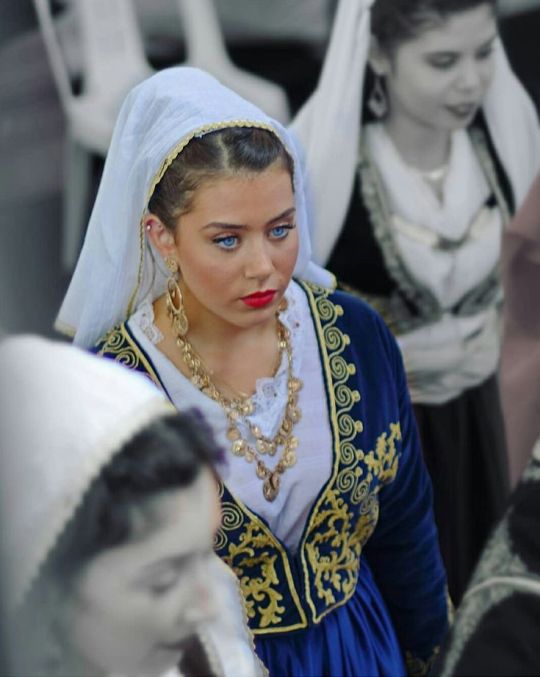
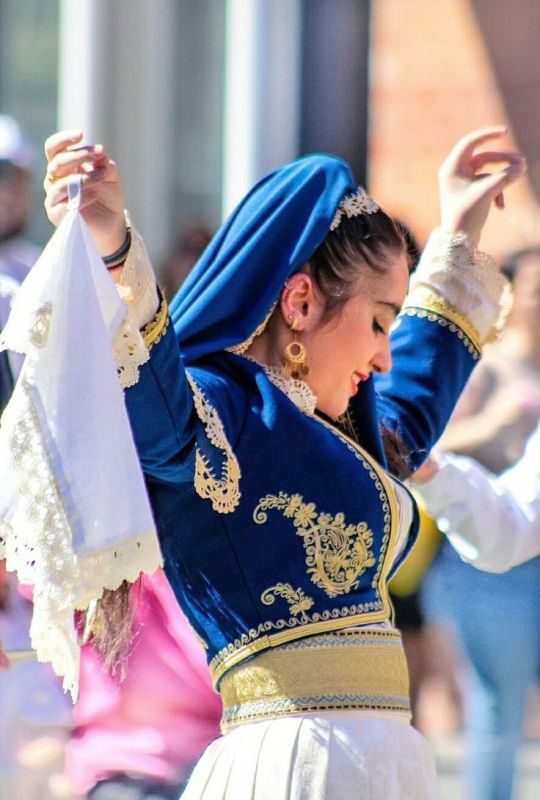
Blue & white traditional Greek dresses. Photos by pontian69 on Instagram.
#greece#europe#historical fashion#fashion#traditional dress#traditional dance#traditional clothing#folk clothing#folk dress#embroidery#greek culture#crete#greek islands
143 notes
·
View notes
